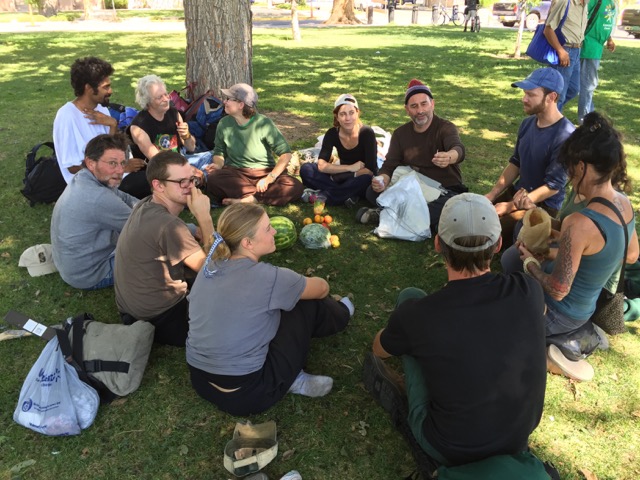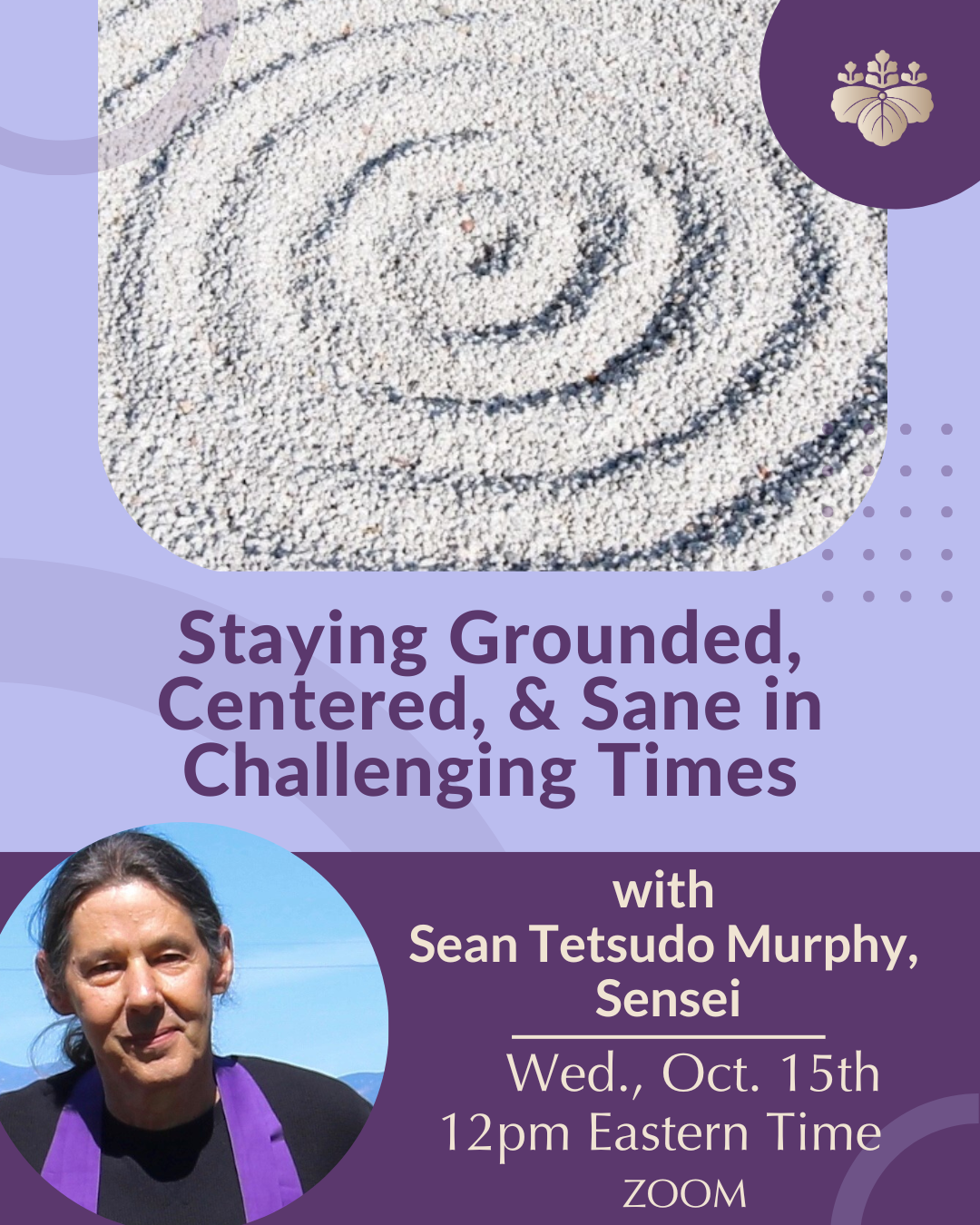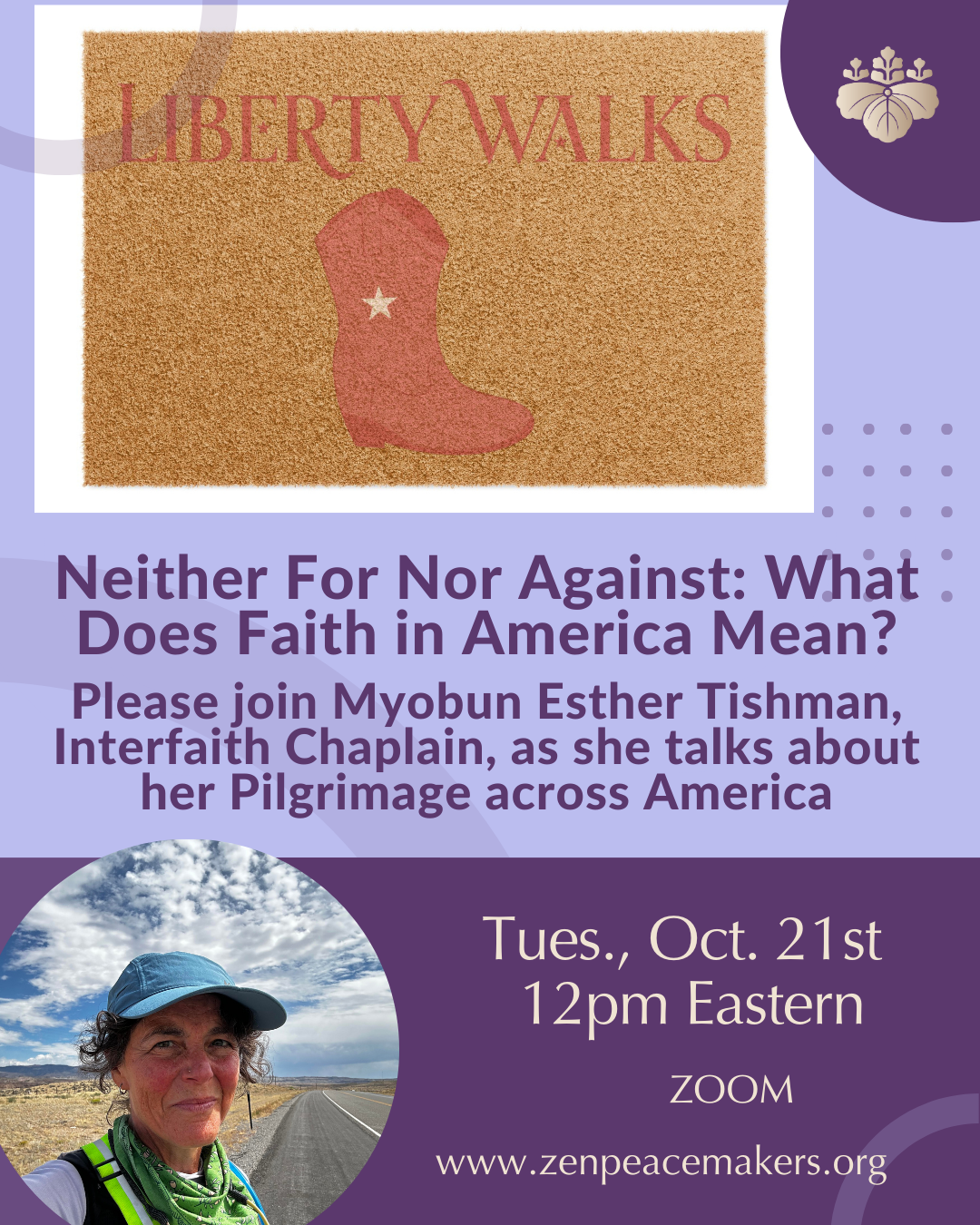By Sensei Joshin Byrnes
Originally appeared on Upaya Zen Center website.
photo: Sensei Joshin Byrnes and sangha members on a street retreat
SANTA FE, NEW MEXICO, USA. The other day we received a letter from a reader criticizing our celebratory essay on the Supreme Court’s decision on gay marriage. Sometimes we get a surprise teaching. In this case, it was the reminder that not everyone sees the world in the same way we do, and sometimes there is a lot more diversity than we think, even very close to home. So, how do we fold this kind of experience into our practice? The letter provided us with an interesting opportunity for reflection. Perhaps many of you find yourselves also defending this or some other dearly held opinion when you are at work, in your families, among friends, or watching the news at night.
The letter we received stated that Upaya, as a Buddhist center, should avoid commenting on politics and that our practice as Buddhists is to “keep personal and political thoughts out of spirituality.”
We chose to celebrate the Supreme Court’s decision because we feel that it is one that is deeply aligned with our understanding of the Buddha’s teaching. According to many stories in the Pali Cannon, he was indeed political, and he integrated a way of being in the political debates of his day with his spiritual practice and with the life of the sangha. The Pali Canon preserves numerous stories where the Buddha makes it a point to radically and boldly insist that people of all castes, social and economic positions, and genders are to be treated equally and be seen as worthy. He makes no qualms about this. It is not a stretch at all to get a picture of the Buddha as someone who took a seriously considered prophetic stance in the common town square of opinion and beliefs.
But it is also clear from some of the early stories that Shakyamuni was not exempt from internally struggling with firmly held and prevalent cultural beliefs in his society. They appear to have caused him some amount of discomfort. We see this in the story where the emotional and sincere request of Mahapajapati (the Buddha’s aunt and stepmother) to be the first woman to be ordained was, at first, rejected by the Buddha. Ananda, the Buddha’s spiritual friend, persistently advocated hard on Mahapajapati’s behalf. He eventually prevailed and Mahapajapati was ordained. But at first, the Buddha resisted, seemingly on cultural grounds, and then with some amount of reluctant surrender, he allowed it to happen. We don’t really know historically when this story took place in the Buddha’s chronology, but it stands out as an important part of the spiritual narrative preserved by the sangha. There are many additional stories in the Pali Canon that indicate that the Buddha eventually took positions of radical inclusivity and stood strongly for equality and justice for all beings. So, we are all in a process, and we are in good company. And, this narrative suggests to us that the political and the spiritual may not be as separate from one another as our modern minds would like to think. Most respected historians agree that the separation of the sacred and the secular is only a very recent historical distinction. Earlier cultures could not conceive of separating their spiritual ethics and practices from the political structures of their time. This is the key point made by the highly regarded historian, Karen Armstrong, in her recent book, Fields of Blood: Religion and the History of Violence.
We recognize that there are many disparate points of view that can exist simultaneously, each one expressing some slice of a narrative that is caused and conditioned by individual, cultural, political, and religious experience. I’m of the opinion that our practice of opening our awareness to see all things means that we have to include in our field of vision the great diversity of opinion that exists among our fellow humans. At Upaya we regularly engage in Council Practice where we make our best effort to speak from the heart, which we did in this particular piece on the issue of the recognition of same sex marriage. Alongside speaking, we also endeavor to practice listening from the heart, hearing what people are saying with as little personal bias as possible.
So we receive this letter from the reader with gratitude, in this spirit of deep listening, recognizing the richness and the worthy challenge of living peacefully among the great diversity that exists in our world. It is an important reminder, perhaps for all of us who are attempting deep practice, to think concretely and practically about Dogen’s teaching: “Each moment is all being, each moment is the entire world. Reflect now whether any being or any world is left out of the present moment.” This doesn’t mean that we spiritually gloss over or sugarcoat the real challenges presented by diversity of opinion. But perhaps it does remind us that practice involves cultivating a willingness to encounter the 10,000 opinions with curiosity, dignity, perspective taking, and in a spirit of considering and doing what will serve to reduce suffering and encourage peace.
Read more like this at the Upaya Zen Center blog.
Sensei Joshin Byrnes is a dharma teacher at Upaya Zen Center as well as its current President and Vice Abbot. He is a student of Upaya’s founder, abbot, and guiding teacher, Roshi Joan Halifax and is a lineage holder in the Maezumi Roshi and Bernie Glassman Roshi family of Soto Zen and the Zen Peacemaker Order.




1件のフィードバック
Thank you, Joshin, for that statement! This is indeed an ongoing dilemma: how to be true to one’s belief in justice, and how to be able to listen at the same time to voices that have a different point of view. It is easy when you are with like-minded people, but how do you act when you find yourself in a different camp? I have personally moved recently from California to the Midwest and am encountering a different culture. As spiritual leader I am supposed to serve all, so it’s a very real question indeed!